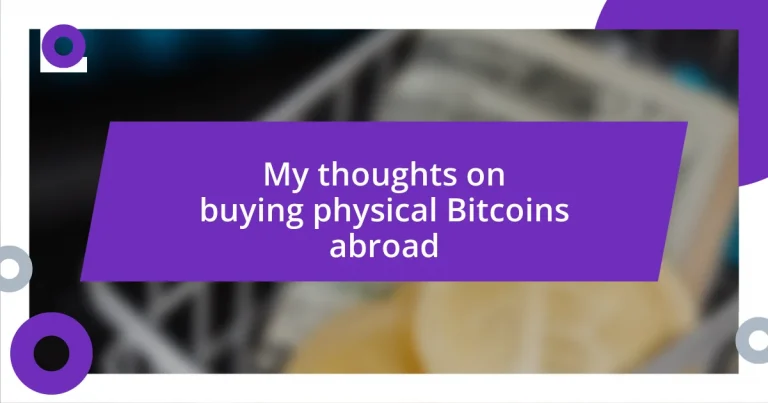Key takeaways:
- Physical Bitcoins provide security, emotional connections, and community engagement, acting as a tangible bridge between digital currencies and traditional investments.
- When buying abroad, it’s essential to understand local regulations, including licensing, tax implications, and consumer protections, to avoid legal complications.
- Secure storage of physical Bitcoins is crucial; options include safe deposit boxes, fireproof safes, and having backup copies in separate locations to mitigate risks.
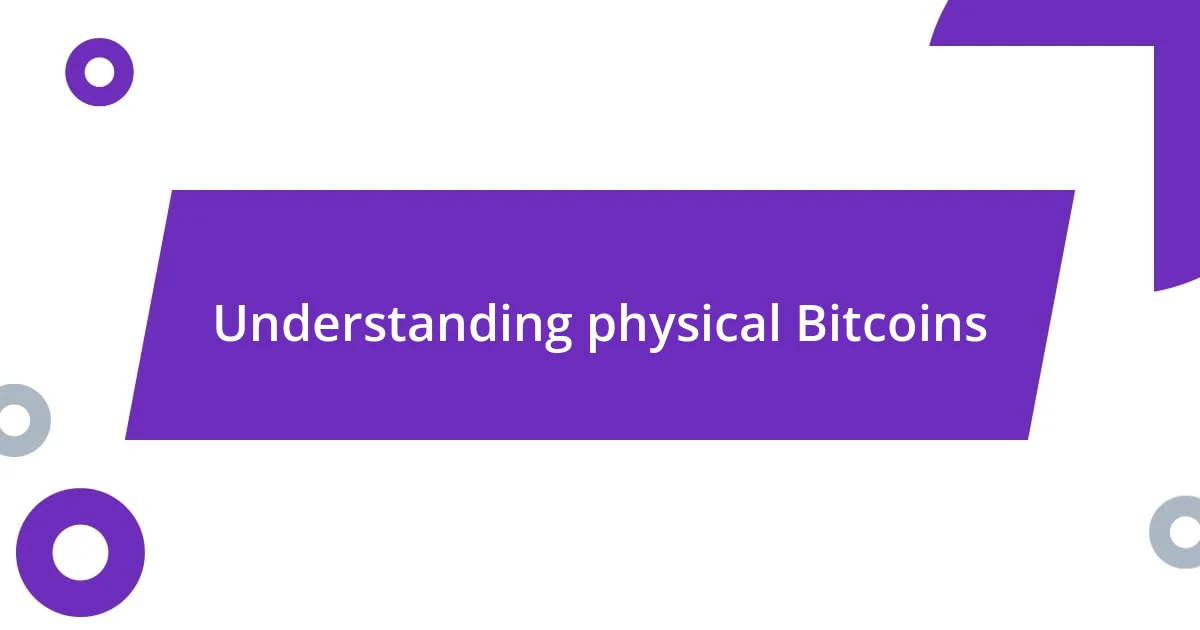
Understanding physical Bitcoins
When I first stumbled upon the concept of physical Bitcoins, I was both intrigued and skeptical. Unlike the digital form most people are familiar with, these are physical coins that come with a unique code on them, representing actual Bitcoin. It made me wonder—can something so intangible really be held in your hand?
One day, while visiting a tech expo, I found myself at a booth showcasing beautifully crafted physical Bitcoins. I remember running my fingers over the cool metal and reflecting on how they blend art with avant-garde technology. It’s a curious intersection, isn’t it? The tactile presence of a physical asset brings a sense of security, yet the nature of Bitcoin is meant to be decentralized and digitized.
Interestingly, these coins often carry additional value, such as being collector’s items or art pieces in their own right. It got me thinking: is the allure of owning a physical Bitcoin about the investment or the experience? After all, adding a tangible token to a portfolio feels like a bridge between traditional finance and the digital frontier—like holding a piece of the cryptoverse in your hand.
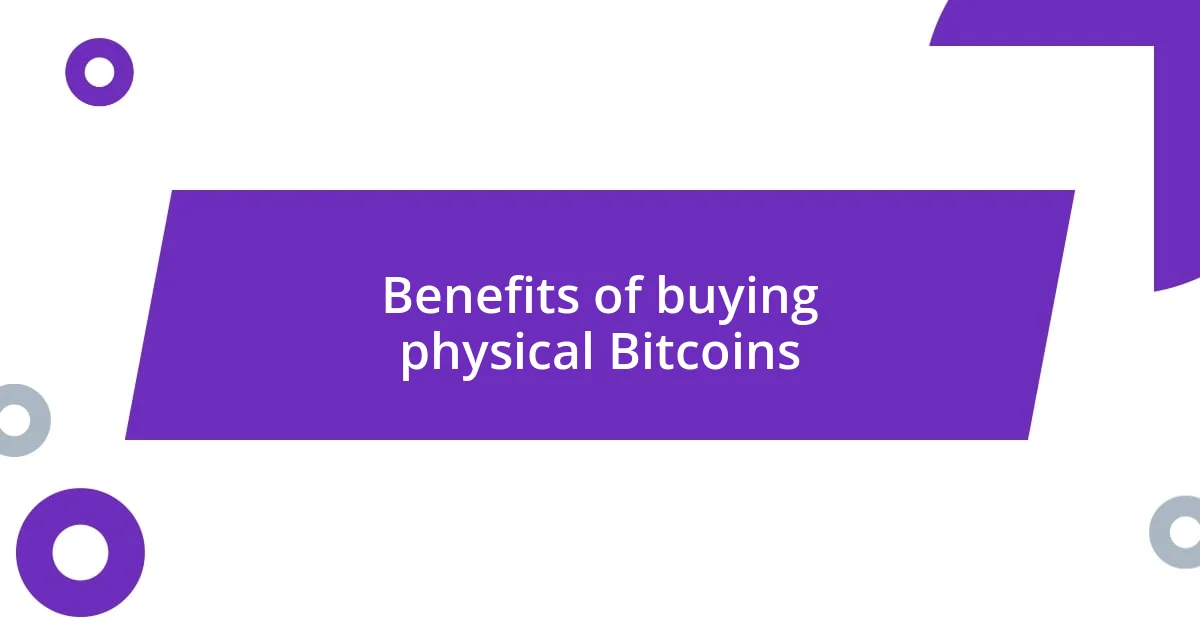
Benefits of buying physical Bitcoins
When I consider the benefits of buying physical Bitcoins, one significant advantage stands out: security. I recall a friend who lost access to his digital wallet because of a forgotten password, leaving him in a panic. Physical Bitcoins eliminate that vulnerability—it’s like having cash in your pocket rather than waiting for the bank to authorize a transfer. You can’t get hacked if you’re holding a coin!
Another benefit I’ve experienced firsthand is the emotional connection. I once gifted a beautifully designed physical Bitcoin to a family member who was curious about cryptocurrency. The joy on their face was priceless! It’s not just a financial asset; it’s a conversation starter, a unique gift, and a way to share my enthusiasm for this innovative currency.
In addition, purchasing physical Bitcoins can often keep you engaged with the community. At a local meet-up, I noticed how these coins sparked discussions among enthusiasts and collectors alike. They serve as a bridge to larger conversations about crypto investments and strategies. It’s fascinating how such a small object can enrich interactions and build meaningful connections among people who share similar interests.
| Benefit | Description |
|---|---|
| Security | Owning a physical coin provides protection against digital hacks and wallet access issues. |
| Emotional Connection | Physical Bitcoins create a tangible link to the cryptocurrency world, enhancing personal experiences. |
| Community Engagement | They act as conversation starters, fostering interactions with fellow enthusiasts. |
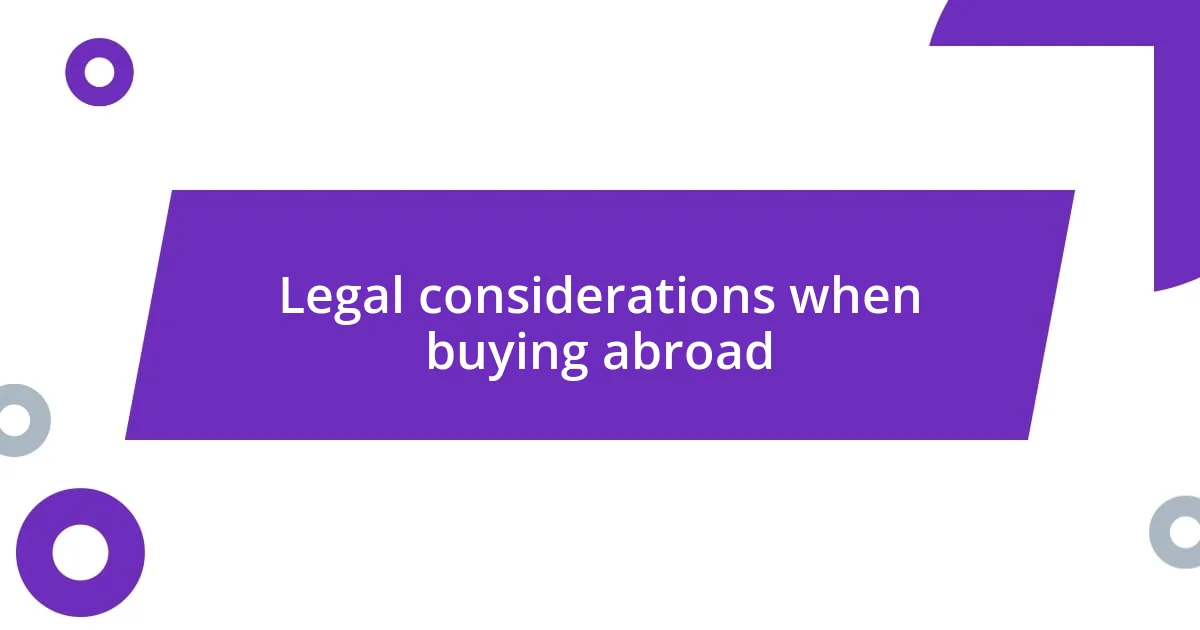
Legal considerations when buying abroad
When considering the legal aspects of buying physical Bitcoins abroad, it’s crucial to be aware of the regulations in the country where you intend to make a purchase. I once mistook the eagerness to own a physical Bitcoin for the excitement of travel, but that enthusiasm quickly dissipated when I learned about varying local laws. For example, while some countries embrace cryptocurrency, others enforce stringent restrictions. Understanding these legal frameworks can save you from unexpected trouble.
Here are some key legal considerations to keep in mind:
- Licensing Requirements: Some countries require sellers to have specific licenses to deal in cryptocurrencies.
- Tax Implications: You might face taxes on your purchase or capital gains when selling later.
- Import/Export Laws: Depending on local regulations, bringing physical Bitcoins back to your home country may require declaration or could be subjected to compliance checks.
- Consumer Protection Regulations: It’s vital to know what protections are in place in case of fraud or disputes.
- Currency Acceptance: In some jurisdictions, Bitcoin and similar cryptocurrencies may not be recognized as legal tender, complicating transactions.
Navigating the legal landscape isn’t just a dry requirement; it’s part of the journey I wish I’d taken more seriously. If I had researched the legalities beforehand during my travels, I could have avoided unnecessary hurdles. I recall a friend who, eager to purchase a physical Bitcoin while abroad, ended up facing hefty fines due to a lack of knowledge about the local regulations. It’s a lesson learned—being informed adds layers of confidence to the thrill of ownership.
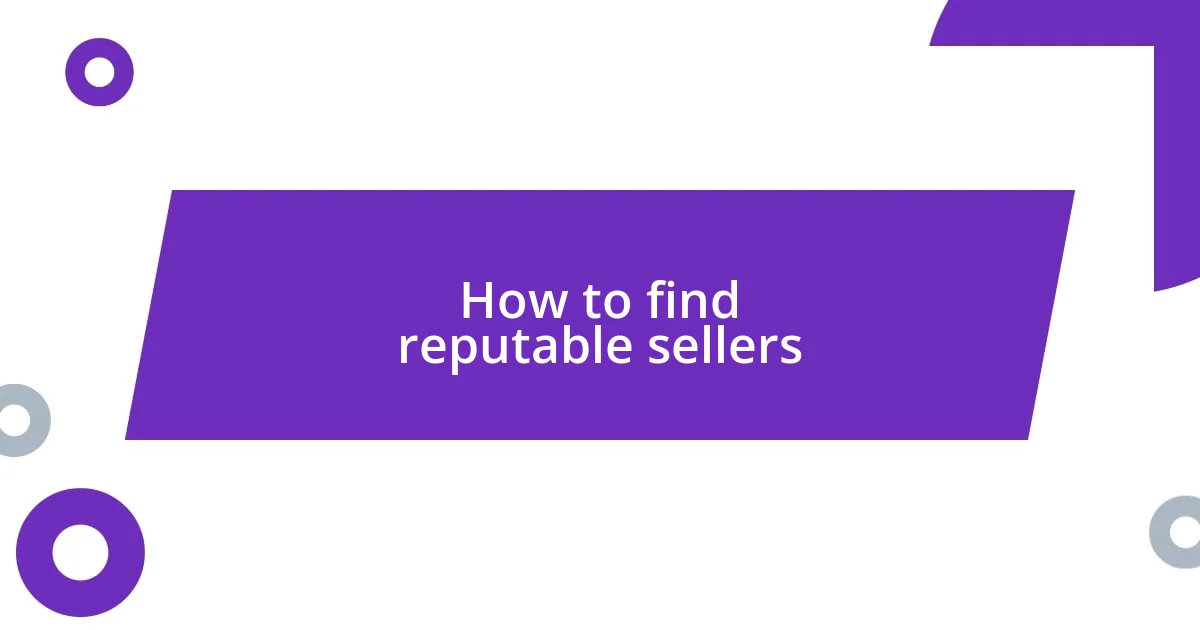
How to find reputable sellers
Finding reputable sellers when buying physical Bitcoins can feel daunting, but my experiences have taught me a few reliable strategies. I always start by seeking out established cryptocurrency exchanges with a solid reputation. A few months ago, I found a local seller through a well-known exchange’s marketplace, and I felt at ease knowing they had verified credentials and positive customer reviews.
Another tip I can’t stress enough is to delve into online communities and forums. I joined a Facebook group dedicated to cryptocurrency enthusiasts and within days, I found threads discussing trusted sellers in various regions. It’s comforting to hear firsthand accounts from others who have navigated similar purchases. Have you ever experienced the thrill of connecting with like-minded individuals? That sense of community can lead you to reputable sellers, often saving you from potential scams.
Finally, don’t hesitate to ask for face-to-face meetings when possible. I once met a seller in a coffee shop, and it made all the difference in my comfort level. There’s something about shaking hands and having an open conversation that adds a layer of trust. Have you thought about what it means to invest in something tangible? It’s all about feeling confident in your choice, and building that relationship with the seller can truly enhance the experience.
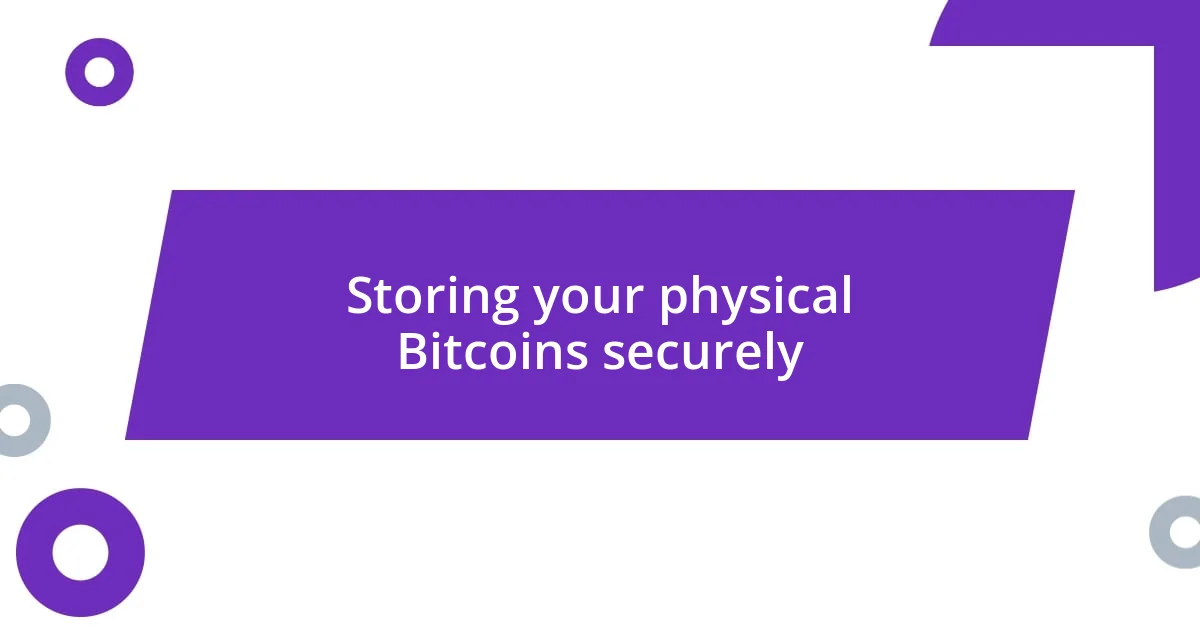
Storing your physical Bitcoins securely
Storing physical Bitcoins securely is a crucial aspect that often flies under the radar. I’ve learned the hard way that leaving such valuable items in plain sight, even at home, can be risky. I remember a time when I tucked my Bitcoin away in a drawer, feeling clever about disguising it. But a close call made me rethink my strategy—what if someone stumbled upon it? Since then, I’ve opted for a safe deposit box at a trusted bank, adding an extra layer of peace of mind.
Another method I’ve found effective is investing in a high-quality safe for my home. A few months ago, I purchased a small, fireproof safe for my Bitcoin, ensuring that both security and safety are prioritized. It’s comforting to know that my investment is protected from both theft and potential disasters. Have you considered where your treasures are kept? Sometimes, taking the time to find a secure, less conventional storage option can make all the difference.
And here’s something that I can’t stress enough: always think of redundancy in your storage plans. When I first bought my physical Bitcoin, I didn’t think about backups. After some research, I decided to keep a duplicate in a different location—just in case. Imagine the relief I felt when I heard a troubling news story about local break-ins. It was a wake-up call, reminding me that a little precaution goes a long way. How are you handling yours? Let’s ensure our physical assets remain close to us for the long haul!
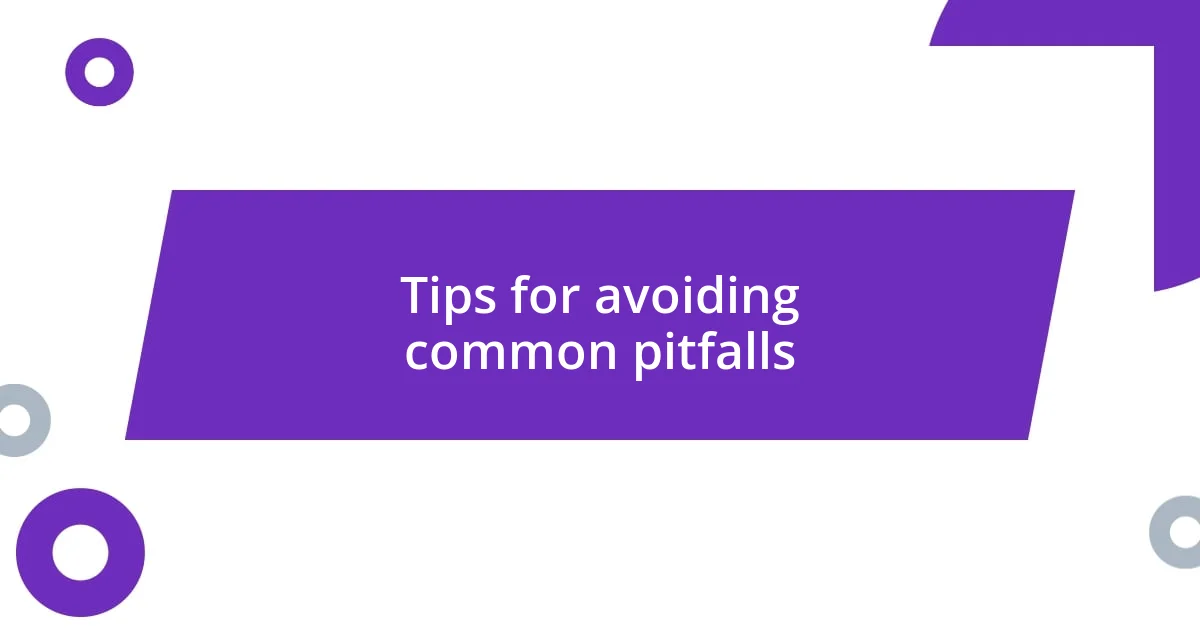
Tips for avoiding common pitfalls
One pitfall that many face when buying physical Bitcoins abroad is the pressure to complete a transaction quickly. I remember feeling the rush when I was offered an impressive deal during a trip. But I held back, realizing that rushing could lead to overlooking crucial details. Trusted sellers who offer fair pricing will understand if you need time to think. Have you ever felt that urge to jump on an opportunity? Taking a breath can save you from regrettable mistakes.
Another common mistake I’ve seen is ignoring local regulations. During my travels, I once came across a seller who seemed too good to be true, but his operation wasn’t even compliant with local laws. It was a wake-up call for me; imagine the trouble I could have avoided with a simple online search or a conversation with locals. Always take a moment to educate yourself on the legal landscape of the country you’re in. Knowledge not only empowers you but also boosts your confidence in negotiations.
Lastly, never underestimate the value of documentation. When I bought my first physical Bitcoin, I was so excited that I almost forgot to get a receipt. This document ended up being crucial when I later needed to prove ownership. I now make it a point to request invoices and take photos of the transaction. How could a simple piece of paper mean so much? It’s part of protecting my investment and ensuring that my transactions remain transparent. Be proactive; it really pays off!












